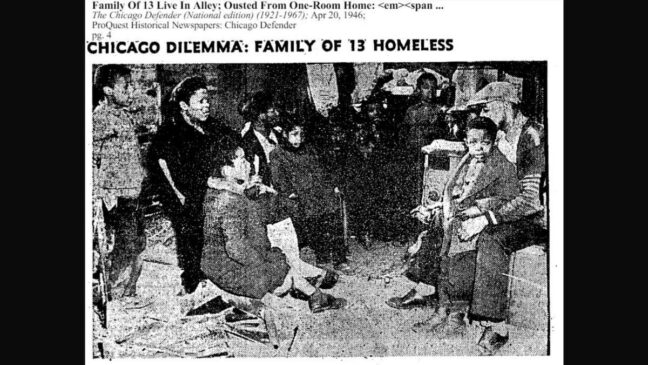By Tacuma Roeback, Chicago Defender Managing Editor
Thanks to the efforts of Carl Hansberry and later the Dr. Martin Luther King Jr., James Bevel, and Al Raby-led Chicago Freedom Movement, the Fair Housing Act of 1968 was ratified, and restrictive covenants were outlawed. What Chicago’s unhoused population and those on the verge of losing their homes face today is similar to what the Hemmons family endured back in 1946. But politics and entrenched segregation by race and class do the work restrictive covenants once did.
Moreover, organizations that advocate for the homeless and affordable housing argue that Chicago residents recently had an opportunity to vote for a transfer tax known as Bring Chicago Home that would’ve helped to change the fortunes of thousands of unhoused persons and those on the verge of losing their homes.
Instead, the March 19 ballot measure was soundly defeated.
With that setback, a familiar theme prevailed, one that governed the lives of families like the Hemmons and thousands of others, especially those who were Black and poor.
“The powers that be have always pushed back on efforts to make access to housing more just because it undermines their profits and their power,” said Douglas Schenkelberg, executive director of the Chicago Coalition for the Homeless. “And so the loss of the referendum question (Bring Chicago Home) is yet another example of the status quo working to maintain the status quo.”
Bring Chicago Home sought to help two groups: people already unhoused and in need of shelter and those on the verge of losing their homes.
According to proponents, BCH would have incrementally raised the city’s real estate transfer tax on properties valued at more than $1 million. The transfer tax would have generated $100 million yearly for mental health services, job training and educational opportunities for the unhoused. Schenkelberg said BCH monies would have funded two large-scale solutions that would effectively address homelessness in the city.
For Schenkelberg and many who work on behalf of the unhoused in Chicago, the great dilemma is knowing that programs that can effectively address homelessness exist but that there isn’t a sustainable funding stream to address large-scale homelessness in the city.
“Are we investing funding at scale in these proven solutions that we can have a measurable impact on the problem?” Schenkelberg said.
As for the business and real estate interests that opposed BCH, Schenkelberg poses this challenge:
“You’ve said multiple times throughout the campaign and after election day that you think addressing homelessness is a very important issue, that it’s something we have to tackle in the city of Chicago,” he said.
“So how are you going to step up in a way that’s meaningful and has a measurable impact on the 68,000 people experiencing homelessness in Chicago? How will you show up differently than you’ve shown up before Bring Chicago Home?”
This time around, the fight still centers around BCH, which supporters contend is not dead.
They vow not to give up.
They believe they have a measure that could disrupt a persistent narrative and resolve a problem that has impacted Black people the most.
“There were 68,000 people experiencing homelessness before Election Day, and there are 68,000 people experiencing homelessness after it, so one election doesn’t change our course over the long term,” said Schenkelberg.
“The work goes on, and we only honor the people who have fought for this for years by continuing to do the work.”








